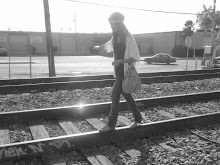Part of an interview with Imam Suhaib Webb from an Egypt Today article by Farzina Alam:
As a Western convert to Islam, Webb has found himself in an unusual position: smack in the middle of East and West. Coming to terms with the responsibility such a position holds isn’t always simple. “As Western Muslims, we have a complex when we deal with the tradition. [In the sense that] we are told that traditional Islam is the savior for everything in the West. But I don’t buy that our job as Western Muslims is to synthesize and articulate a Western Islam.
“There’s nothing wrong with that. The Malaysians articulate a Malaysian Islam. The Pakistanis love biryani; the Arabs hate spices and the Africans like a mix. We in the West, because of the society we live in, because of the way our society moves, we cannot just merely regurgitate sixth- or seventh-century texts and try to answer the crisis of humanity. Our job is to fuse both.”
As a convert, knowing what aspects of East and West to adopt or reject is also a challenge. “I have to engage the tradition first, understand it, then what I learn from the teacher, I have to translate into my experience as a Westerner. And I shouldn’t be ashamed of that.
“We have a lot of brothers and sisters who convert to Islam who experience crises in dealing with modernity. What brought sovereignty to women and urbanization is modernity, what brought management — we don’t have any management here — is modernity.
“At the same time spiritually, I have issues with modernity. The absence of God, the absence of a creator. The outcome of modernity was basically Hitler and Mussolini, but we can take just the good. I felt that I didn’t want to lose my identity as a Westerner. I don’t want to start speaking like,” and he adopts a fake Indian accent for a moment, “‘Hello, my name is Suhaib from Oklahoma.’ I meet brothers who go through this crisis. I meet people who don’t want to dress like a Westerner — why not? You’re a Westerner, brother! The Prophet rarely asked people to change their dress or their names unless their names meant something really bad.”
Webb believes converts in the West have not really come to grips with this fusion. “Our job as Western Muslims is to learn our religion well, to have an understanding and articulation that’s balanced within the confines of our environment, because we represent a reservoir of prophetic guidance to the West. And the West represents a reservoir of material guidance for us.” The trick, he believes, is knowing how to fuse the two.
“All of us, whether you like it or not, here [in the East] we are representatives of the West; [over] there, we are representatives of the East. Although I’m definitely not Eastern: My hair is blond, my eyes are blue. But immediately people assume I have experience with the East because I’m Muslim.”
On that note, I was browsing through some of the videos in the “One Nation, Many Voices Online Film Contest” [which Link TV and One Nation held to educate people about the American Muslim experience] and there are a lot of cool ones – check it out at http://www.linktv.org/onenation
There were two videos that I marked as specifically relating to the interview above (even though I'm sure there are more): The first is about snowboarding and how these boarders find it spiritually uplifting – who would’ve thought? I mean isn’t snowboarding all about catching air and trying to defy gravity? Not for all! I think it’s a perfect example of growing up as an American Muslim – maintaining balance between American youth culture and their Islamic identity - so in between all of the snowy-chaos these kids find time to reflect. There is no need to put Orientalist labels on all of us and be like “oh my gosh you’re so exotic” – nah they’re probably out there doing just as many Rippey-flip-Half-Cab-Shifty-Lime-Grabs as the next person.
The second one is called “A Land Called Paradise” it’s self explanatory – Islam stands for diversity, America stands for diversity. <3




